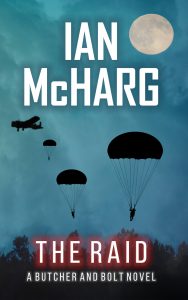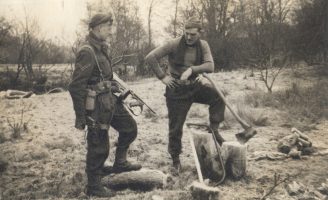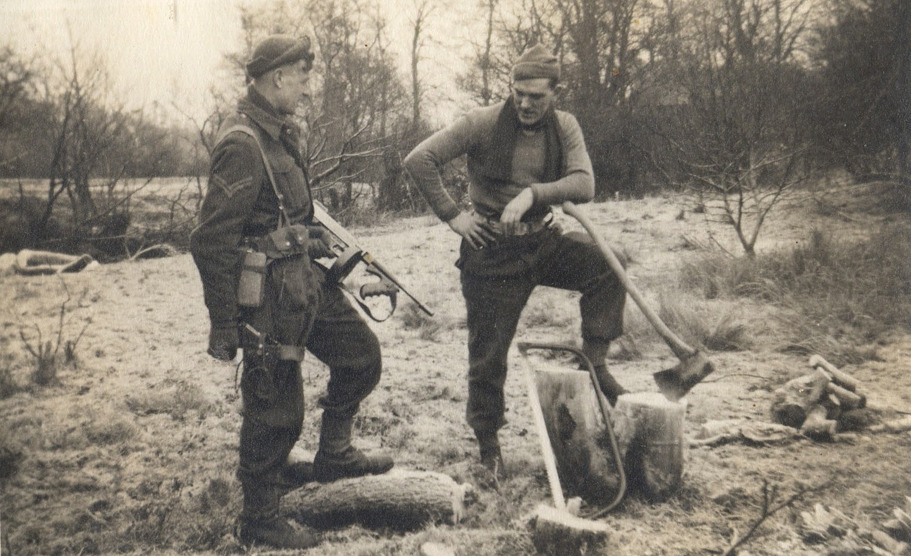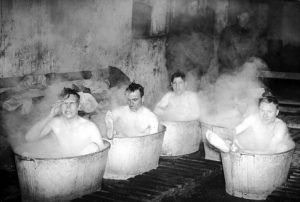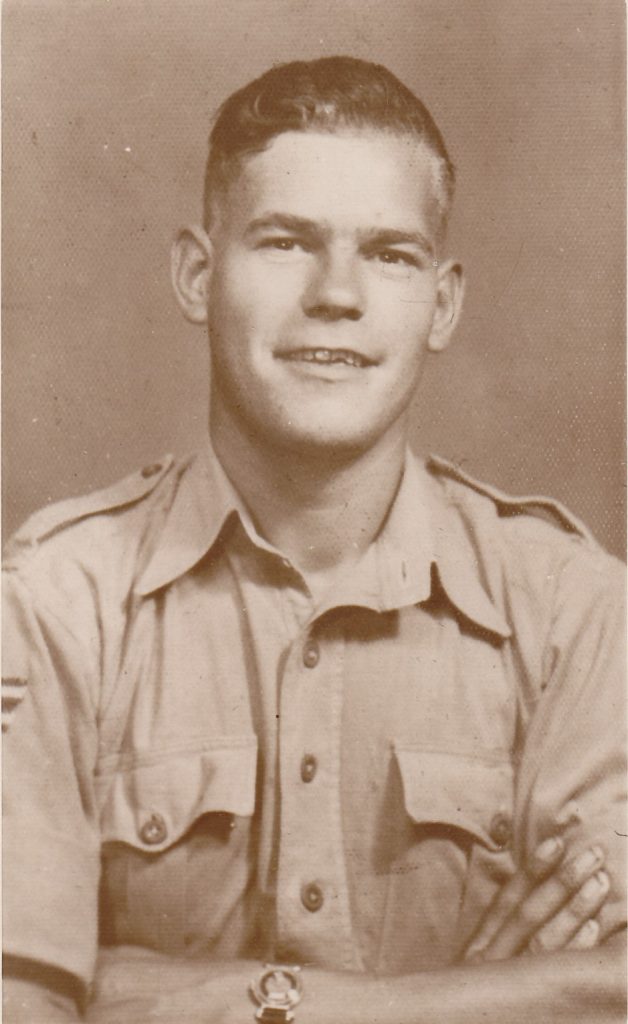The routine for the officers and men in the Commandos was quite different to that from the regiments that they’d left behind. With no barracks or fixed accommodation, they lived in billets where their meals were provided by the families that they stayed with. To pay for their keep, officers were given a daily allowance of thirteen shillings and four pence, while the men were allowed six shillings and eight pence.
In towns and villages on the west coast of Scotland and south coast of England the commandos were mothered by welcoming landladies. Permanently wet uniforms were dried and hungry young men were fed and watered. With up to four men in a billet, space was tight and strict routines had to be adhered to. Cold water was used mainly for ablutions and in some cases, for bathing. Those lucky enough to have hot water would take baths in turn.
Commandos on the Isle of Arran ©Gavin Mortimer
For some ladies however, looking after the commandos was a bit more than they were used to, Mary Crawford, a young married woman from the Isle of Arran explained:
‘From looking after and cooking for one man I found myself looking after and cooking for six. I received twenty-five shillings per week per head plus ration books. For this they had four meals a day and if they were out training in the hills they got iron rations with them. I had three boys from Newfoundland, one from Yorkshire, one from Edinburgh and a Fifer. When the two Scots boys got into an argument, their accents grew broader and broader and so I acquired another job – as an interpreter! One-day Captain Keyes called to see me and said that he hoped that each boy would have a bath at least once a week. The boys paid me sixpence each time they had a bath, as you can imagine to keep the hot water flowing for three or four baths per evening meant that the coal just disappeared up the chimney like magic. In the row of ten houses only two had baths, No.10 and mine at No.5, so it was not only the boys who were billeted with me who required baths.’
Communal bathing.
Reg Harmer of No.11 Commando stayed with the McCall family in Lamlash, recalled how they fitted in:
‘I stayed with Ma McCall, and her daughter Jessie, who was fifteen years old. Ma had that much faith in me that when there was a dance on, she would tell Jessie, who was dancing mad that, “Yes you can go to the dancing but only if Reg comes and picks you up”.’
Reg Harmer
Such was the relationship between the commandos and the families that they were soon treated like brothers and sons and truly embraced by the communities. As Des Chappell of No.1 Commando explained, romance was never far away:
‘I met my wife in Dartmouth. I found a billet at No.1 Old Castle Steps, which is one of the older parts of Dartmouth. When I went in through the door, there was a girl down on her hands and knees scrubbing the floor…we went out together, and from that minute we were never apart.’
However, flirtation with the local girls didn’t come without warning, as Desmond Crowden of No.5 Commando recalled:
‘We were put on a train one evening not knowing where we were destined for. Almost the whole of Barrhead was out there because by then several romances had built up – one or two of the chaps had got married to Scots girls, and they were all there to say goodbye – it was quite a rousing send off. We got on this train and we disappeared into the night. Our first stop was Bristol, where we had breakfast in the station and then the train pulled out again and we eventually landed in Falmouth, a wonderful town. When we got out of the train we were marshalled to the station car park where the Adjutant addressed us. I found part of his address quite embarrassing because he told us that we were in a sea port where there would be a few undesirable girls, and if anyone got VD they would be returned to their unit!’
While in the billets, rifles and other weapons were also the personal responsibility of the men – a situation not always welcomed by the landladies. Reg Harmer:
‘Ma McCall was a lovely woman, but her only rule was no ammunition in the house – “I’m not having any ammunition in here, Reg” she would say. We were in the back house which was only a wooden shack, well, if she had only looked under the beds! I had cases and cases of .303 and 50 Boyes anti-tank and a couple of boxes of hand grenades.’
The Boyes Anti-Tank Rifle
During his time in No.11 Commando, SAS legend Paddy Mayne, also appreciated having his weapon in the house:
‘Five of us are in a small parlour house, only for sleeping of course. I prefer it. We keep a fire going, have a gramophone, and there is a pot of tea made in the evening. I think this is the sort of place I’ll live in. No women about it, and clothes lying about all over the place, dirty teacups on the floor, wet boots in the oven, a rugby jersey over one armchair and your feet on the fender, a perfect existence. We have lots of labour saving devices – the coal is in very large lumps. To split it we just fire a revolver shot into it, it cracks it wonderfully.’
However, as Geoff Riley of No. 5 Commando explained billets and bullets could be a dangerous combination:
‘Every serving man knows the cardinal rules regarding weapons and the loading of them when not in use – they must be empty. Being a Mountain Troop (No.1), we were practising cliff-climbing with a bunch of us kipping in a local guest house at Salcombe in Devon. Our Commando rules were not as restrictive in our use of weapons as we were expected to have more sense than the average soldier. One Sunday morning, a couple of us were going out to do a little practice with a Colt .45. It started to snow so my comrade, Jock Hardy, handed me the gun and said he wasn’t going. I took the pistol and absent-mindedly cocked it, and as I pulled the trigger, Jock shouted, “It’s loaded!” Too late. With a crash the bullet hit the floor. With “Oh my God!” they all scattered, leaving me alone in the room. At that moment a trembling landlady appeared. She had been in the kitchen below and about to make a cake. She’d climbed onto a chair and reached onto the shelf for the cake tin at the same time as my slug crashed in with the speed of a space rocket, knocking the tin out of her hand, before ricocheting round the kitchen until it smashed into the chair, leaving her sprawling around the floor, with a big hole in the ceiling!’
For more blogs by Ian McHarg click here
For books by Ian McHarg click here
Don’t miss out on the latest Butcher and Bolt novel The Raid.
Buy it here now. 